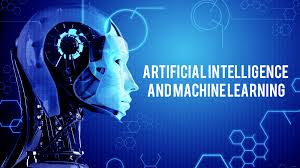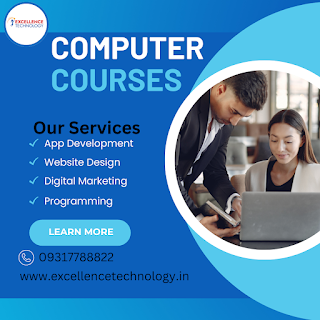Computer Course in Chandigarh
What is computer course? Benefit of Computer course.
A computer is a versatile electronic device designed to process, store, and manage data through a combination of hardware and software. Its primary function is to execute a wide range of tasks based on programmed instructions, making it an indispensable tool in modern society.
Hardware and Components
The core of a computer's hardware includes the Central Processing Unit (CPU), which is often likened to the brain of the computer. The CPU carries out instructions from programs by performing basic arithmetic, logic, control, and input/output operations. The performance of a computer largely depends on the speed and efficiency of its CPU.
Memory, particularly Random Access Memory (RAM), is crucial for a computer's operation. RAM serves as short-term memory, temporarily holding data and instructions that the CPU needs while performing tasks. The more RAM a computer has, the more data it can handle simultaneously, which often leads to better performance in multitasking environments.
Storage is another essential component. Computers use storage devices like Hard Disk Drives (HDDs) or Solid-State Drives (SSDs) to save data and programs for long-term use. SSDs are generally faster and more reliable than HDDs, but both serve the crucial role of retaining information even when the computer is turned off.
The motherboard, or main circuit board, is the central hub where all the components connect and communicate. It houses the CPU, RAM, and other essential parts and provides pathways for data to travel between these components. The motherboard also includes connectors for additional hardware like graphics cards and storage devices.
Input and Output Devices:-
Computers rely on input devices to receive data from users. Common input devices include keyboards, mice, and touchscreens. These devices allow users to interact with the computer, enter data, and execute commands.
Output devices, on the other hand, are used to present the results of computer processes. Monitors display visual information, while printers produce physical copies of documents. Other output devices might include speakers for audio output or projectors for large-scale presentations.
Software and Operating Systems:-
The software is a set of instructions that tells the computer how to perform specific tasks. The most fundamental software is the operating system (OS), which manages the computer's hardware and provides a user interface. Popular operating systems include Windows, macOS, and Linux. The OS facilitates user interaction by providing a graphical user interface (GUI) with icons, windows, and menus.
Applications or software programs run on top of the operating system and perform specialized functions. These can range from productivity tools like word processors and spreadsheets to entertainment software like video games and multimedia players.
Networking and Connectivity:-
Modern computers are often networked to communicate with other devices and systems. Networking allows computers to share resources, such as files and printers, and access the internet. This connectivity is enabled through various interfaces, including Ethernet ports, Wi-Fi, and Bluetooth. The internet itself is a vast network of computers interconnected globally, allowing for information sharing, communication, and access to online services.
Evolution and Impact:-
The development of computers has dramatically transformed various aspects of life. From personal computing to business operations and scientific research, computers have revolutionized how we work, learn, and interact. They have enabled advancements in fields like artificial intelligence, data analysis, and automation, shaping the modern world in profound ways.
In summary, a computer is a complex and adaptable machine that performs a wide range of functions through its hardware components and software. Its ability to process data and execute instructions makes it a fundamental tool in contemporary life, driving innovation and efficiency across various domains.
Benefit of Computer.
Computers offer numerous benefits across various domains. Here are some key advantages:
1. Efficiency and Speed:- Computers can process and analyze data much faster than humans. This speed enhances productivity in various fields, from business to scientific research.
2. Data Storage and Management:-They provide massive storage capacity for data and allow for efficient organization, retrieval, and management of information.
3. Automation:- Computers can automate repetitive tasks, reducing the need for manual intervention and minimizing errors. This is especially useful in manufacturing, data entry, and other routine processes.
4. Connectivity and Communication:- They enable instant communication and collaboration through email, social media, and video conferencing, bridging geographical gaps.
5. Information Access:- The internet provides vast amounts of information on virtually any topic, making research and learning more accessible than ever before.
6. Problem-Solving and Simulation:- Computers can model complex systems and run simulations to solve problems or predict outcomes in fields like engineering, finance, and medicine.
7. Entertainment and Creativity: -They offer platforms for gaming, digital art, music production, and other creative endeavors, enhancing leisure and self-expression.
8. Education and Training:- Computers facilitate e-learning, virtual classrooms, and access to educational resources, making education more flexible and available.
9. Healthcare Advancements:- They play a crucial role in diagnostics, treatment planning, medical research, and the management of healthcare records.
10. Economic Growth:-Computers drive innovation and efficiency in businesses, contributing to economic development and creating new job opportunities.
COMPUTER COURSE:-
1. Introduction to Computer Science:- This course covers the fundamentals of computer science, including programming basics, algorithms, data structures, and problem-solving techniques. It introduces students to key concepts and tools used in the field, laying the foundation for more advanced studies.

2. Data Structures and Algorithms:- Focused on the core building blocks of computer science, this course dives into various data structures (like arrays, linked lists, stacks, and queues) and algorithms (such as sorting and searching). Students will learn how to choose and implement the most efficient solutions to computational problems.
3. Web Development Fundamentals:- This course provides an overview of web development, including HTML, CSS, and JavaScript. Students will learn how to create and design websites, handle user interactions, and ensure compatibility across different browsers and devices
.
4. Introduction to Cybersecurity:-This course introduces the principles of cybersecurity, including threat detection, risk management, and security protocols. Students will gain an understanding of how to protect information systems and data from cyber threats
5. Database Management Systems:-This course explores the design, implementation, and management of databases. Topics include relational database design, SQL querying, data normalization, and database administration.
6. Software Engineering Principles:-Focused on the methodologies and best practices of software development, this course covers the software development lifecycle, including requirements analysis, design, coding, testing, and maintenance. Students will learn about various software engineering models and tools.
7. Machine Learning and Artificial Intelligence:-This course provides an introduction to machine learning and AI concepts, including supervised and unsupervised learning, neural networks, and natural language processing. Students will learn to implement and evaluate machine learning models using popular frameworks.
8. Mobile App Development:-This course covers the development of applications for mobile devices. It includes topics like mobile operating systems, user interface design, app architecture, and integration with APIs. Students will gain hands-on experience with tools and frameworks for both iOS and Android development.
9. Cloud Computing Fundamentals:- This course introduces cloud computing concepts and services. Students will learn about cloud service models (IaaS, PaaS, SaaS), deployment models, and popular cloud platforms. The course also covers cloud security and cost management.
10. Ethical Hacking and Penetration Testing:- This course explores the techniques and tools used in ethical hacking and penetration testing. Students will learn how to identify vulnerabilities in systems, conduct security assessments, and implement measures to safeguard against cyber attacks
IMPORTANCE OF COMPUTER COURSE:-
Taking a computer course can be incredibly valuable for a variety of reasons:
1. Career Opportunities:- In today's job market, computer skills are often essential. Many professions require a basic understanding of computer systems, software applications, and data management. Advanced computer courses can also open doors to specialized fields like programming, cybersecurity, and data analysis.
2. Productivity:- Learning how to use software efficiently can significantly boost productivity. Courses can teach you how to use tools like spreadsheets, word processors, and presentation software more effectively, which can be beneficial in both personal and professional settings.
3. Technical Literacy:- Understanding how computers work and how to troubleshoot common issues can save time and reduce frustration. It also helps you make informed decisions about technology and digital tools.
4. Problem-Solving Skills:- Many computer courses involve learning how to approach and solve complex problems, which can enhance your analytical and critical thinking skills.
5. Digital Literacy: -As technology evolves, being digitally literate is crucial. This includes understanding internet safety, privacy, and the ability to discern credible information from unreliable sources.
6. Adaptability:- Technology is constantly changing, and taking computer courses can help you stay current with new tools and technologies, making it easier to adapt to changes in your work or personal life.rning how to code, design, or use digital tools can lead to new ideas and projects.
8. Personal Development:- Gaining new skills can boost your confidence and provide a sense of accomplishment. It can also be a great way to pursue personal interests, whether that’s building your own website, creating digital art, or automating tasks.
7. Creativity and Innovation:- Many computer courses, especially those related to programming or digital media, encourage creativity and innovation. Lea
Best institute in Chandigarh for Computer course:-
Excellence Technology provide the Computer course. I have also 6th month training experience in Excellence Technology. I can suggest the professional course in Excellence Technology , the institute also provide the courses like Web Developing , Java, C and C++, Digital Marketing etc.
Web Developing:- Web Development course offers a comprehensive introduction to creating and maintaining dynamic websites. Covering both front-end and back-end development, students learn HTML5, CSS3, JavaScript, and popular frameworks like React and Node.js. The course emphasizes responsive design, user experience, and modern web technologies. With hands-on projects and real-world applications, participants build practical skills in coding, debugging, and deploying web applications. Ideal for beginners and professionals alike, this course equips you with the tools to develop robust, user-friendly websites and applications. Gain the expertise needed to start a career in web development or enhance your existing skill set.
Java:- Java course provides a solid foundation in one of the most widely-used programming languages. Students will learn core Java concepts, including object-oriented programming, data structures, and algorithms. The course covers Java syntax, control structures, and exception handling, along with advanced topics like multithreading, file I/O, and Java’s standard libraries. Through hands-on exercises and real-world projects, participants will gain practical experience in developing robust, scalable applications. Ideal for beginners and those looking to deepen their programming skills, this course prepares you for Java development roles and enhances your problem-solving abilities in a professional context.
C and C++:- C and C++ course offers a comprehensive introduction to these foundational programming languages. Students will explore C’s core concepts, including syntax, data types, pointers, and memory management. The course then transitions to C++, covering object-oriented programming, classes, inheritance, and polymorphism. Through practical exercises and projects, participants will gain hands-on experience in writing efficient, high-performance code. Ideal for beginners and those seeking to enhance their programming expertise, this course equips you with the skills needed for system programming, game development, and high-performance applications. Mastering C and C++ opens doors to various advanced programming and development opportunities.
Digital Marketing:- Digital Marketing course equips you with the essential skills to thrive in the online marketplace. Covering key areas such as search engine optimization (SEO), social media marketing, content creation, email marketing, and pay-per-click (PPC) advertising, the course provides a comprehensive understanding of digital strategies and tools. Students learn to analyze market trends, optimize digital campaigns, and leverage analytics for data-driven decision-making. Through hands-on projects and real-world scenarios, you’ll gain practical experience in developing and executing effective marketing strategies. Perfect for aspiring marketers and business owners, this course prepares you to drive growth and engagement in the digital world.
ABOUT AUTHOR
My name is Sunyour . I have a experience of computer course of 6th months training in excellence technology.















.png)
Comments
Post a Comment